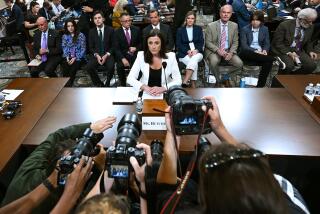North Lied to Congressmen, Defends Actions
- Share via
WASHINGTON — Oliver L. North acknowledged Friday that he helped compose “factually incorrect” letters to congressmen and later made untruthful statements to them in a face-to-face White House meeting--the main offenses on which he is being tried.
But North, in his second day on the witness stand, defended his conduct by contending that members of Congress had no right to know about his secret activities in support of the Nicaraguan Contras, saying that they were covert actions “I knew it wasn’t right to tell the truth about.”
Under questioning by his attorney, Brendan V. Sullivan Jr., the retired Marine lieutenant colonel said that he had reluctantly drafted misleading responses to congressmen for his boss, National Security Adviser Robert C. McFarlane.
Opposed Any Response
North said he had opposed providing any information to Congress and had urged McFarlane to invoke President Ronald Reagan’s prerogative of “executive privilege.”
However, McFarlane decided that a flat refusal to provide information “would be too confrontational,” North said.
He gave North a letter from Rep. Lee H. Hamilton (D-Ind.), who was chairman of the House Intelligence Committee, and told North: “Give me a stab at answering it,” the ex-Marine testified.
“So I did a draft response,” North said, adding that McFarlane sent Hamilton a letter based on two paragraphs of North’s draft.
Hamilton and another congressional witness, former Rep. Michael D. Barnes (D-Md.), testified earlier at the trial that in September, 1985, they had received letters from McFarlane insisting that North was complying with “both the letter and the spirit” of congressional curbs on military aid for the Nicaraguan rebels.
The letters specifically denied press reports that the National Security Council staff officer was helping to raise private money for the Contras or was giving them tactical military advice, two activities that more than a dozen witnesses have said North conducted.
North testified that McFarlane used the same draft response to reply separately to Barnes, who then was chairman of a House Foreign Affairs subcommittee. He said he never wanted McFarlane to send either letter “because the answer he wanted to give them was wrong, not accurate and factually incorrect.”
McFarlane had to know that his draft answer contained lies, North said, because “the answer basically denied the things that he (McFarlane) had had me do.”
Told to See Lawmakers
In August, 1986--a year after McFarlane had sent the letters and eight months after McFarlane had left government service--North said, his new boss, Vice Adm. John M. Poindexter, told him to meet with a congressional delegation that wanted to question North directly about his activities.
“I didn’t think it was a good idea,” North said. “But Poindexter told me: ‘You can handle it.’ I believe I raised with him that there were things that I was doing . . . that should not be revealed. He said: ‘You can take care of it.’ ”
North testified that he was under orders from his superiors not to tell Congress or anyone else about the Reagan Administration’s solicitation of aid from other countries to help the Contras. He said he could not divulge his efforts to resupply the guerrilla forces for fear of jeopardizing the lives or reputations of many others who were helping him, including a number of foreign government officials in Central America.
‘Wasn’t Right to Tell Truth’
“Did you tell the truth at that meeting on Aug. 6, 1986?” Sullivan asked.
“No,” North replied. “I knew it wasn’t right to tell the truth about those (confidential) things.”
In a choked voice, he added:
“I had been raised to know what the Ten Commandments are all about, and I never believed what I did was unlawful.”
North, who is also accused of having altered or shredded many White House documents just before the Iran-Contra scandal was disclosed in November, 1986, blamed his actions on orders issued by McFarlane before he left office.
“McFarlane gave me a list,” North said. “He said: ‘Fix these documents so they will be consistent with what we told the Congress.’ They were his documents. I had written them, but they were memos to him, and therefore his documents.”
McFarlane last year pleaded guilty to four misdemeanor counts of misleading Congress and has been sentenced to two years’ probation and 200 hours of community service and fined $20,000.
In testifying last month at North’s trial, McFarlane gave a different account of the events. He said he thought North was keeping in touch with the Contras on an informational basis to try to keep up their morale until Congress restored full funding for them. McFarlane said he was unaware of the extent of North’s activities in supporting the Contras.
Sullivan led North through a long recitation of repeated trips he had made to Geneva, Cyprus and Beirut in the weeks before he was fired to try to obtain the release of American hostages in Lebanon.
Had Hopes for Hostages
North said that, on the eve of his dismissal, William J. Casey, the late CIA director, felt that the Administration had opened up a promising “second channel” to Iranian moderates that might prove successful in getting hostages freed.
Sullivan had North show jurors a handwritten commendation from President Bush, then the vice president, that North had received a year before his dismissal.
Bush’s note, dated Nov. 27, 1985, praised North for his performance of duty “under fire in tough situations,” adding: “Your dedication to the hostage thing and Central America gives me cause for great pride.”
More to Read
Get the L.A. Times Politics newsletter
Deeply reported insights into legislation, politics and policy from Sacramento, Washington and beyond. In your inbox twice per week.
You may occasionally receive promotional content from the Los Angeles Times.










